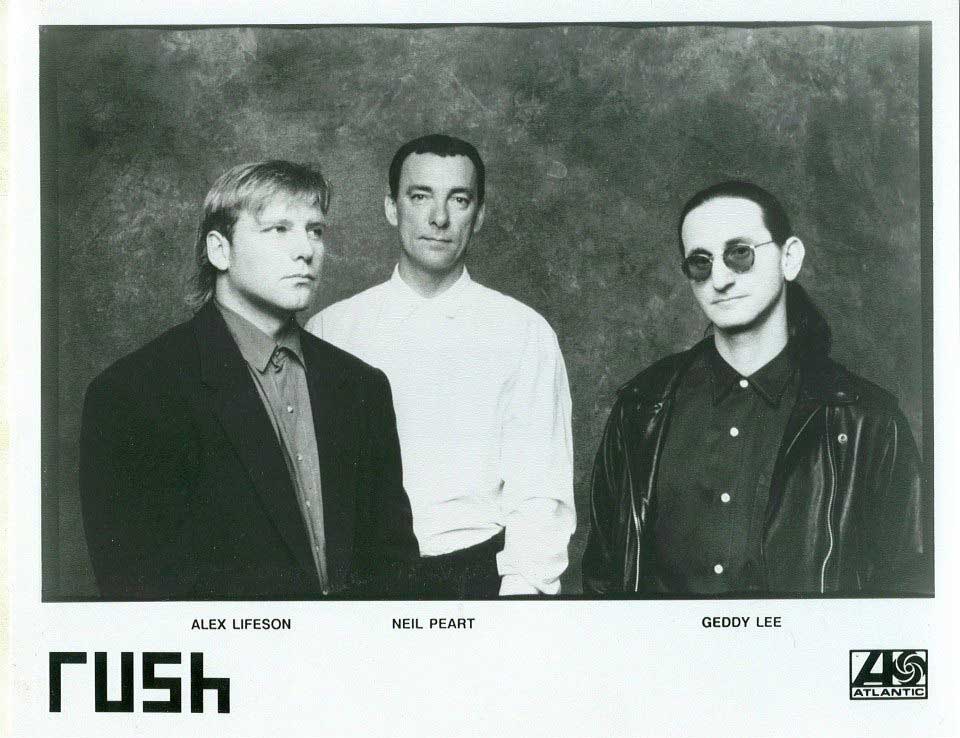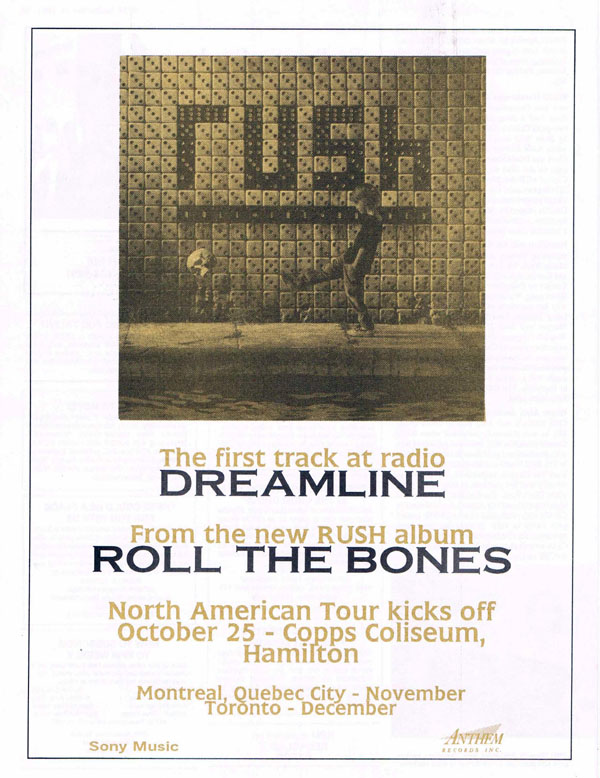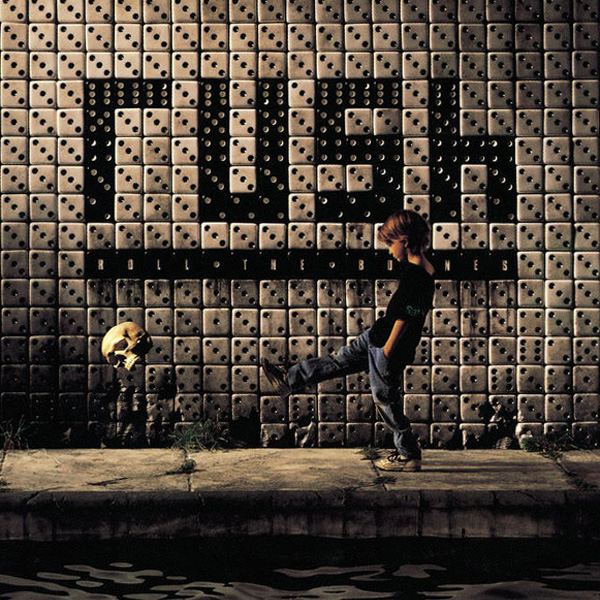
Dreamline (4.38)
Bravado (4:56)
Roll The Bones (5:30)
Face Up (3:54)
Where's My Thing? (3:49)
The Big Wheel (5:15)
Heresy (5:26)
Ghost Of A Chance (5:19)
Neurotica (4:40)
You Bet Your Life (5:00)
ALEX LIFESON
Electric and acoustic guitars, backing vocals
NEIL PEART
Drums and cymbals
GEDDY LEE
Bass guitar, vocals, synthesizers
Produced by Rupert Hine and Rush
Engineered by Stephen W. Tayler
Arrangements by Rush and Rupert Hine
Recorded February-May, 1991, at Le Studio, Morin Heights, assisted by Simon Pressey;
McClear Place, Toronto, assisted by Paul Seeley; and mixed at Nomis Studios, London, assisted by Ben Darlow
Additional keyboards and background vocals by Rupert Hine
Preproduction work at Chalet Studio, by Lerxst Sound, assisted by Everett Ravestein
Mastered by Bob Ludwig, Masterdisk NYC
Management by Ray Danniels, SRO Management Inc., Toronto
Executive Production by Anthem Records: Liam Birt
Art Direction and Design by Hugh Syme
Portraits by Andrew MacNaughtan
Photography by Scarpati
Digitals by Joe Berndt
Special thanks to those who keep us "rolling": At Shallow Studio--The Koopster, David, Rob, Caroline, Logger, the War Room, Chester Sight & Sound, CNN, The Psychedelic Shack, The Sugar Shack, Johnny Abdul, the birds. At Le Studio--Richard, Simon, Linda, Francine, Benoit d'Arleaux, Steve, Dave, Anne-Marie, New England Digital (Nick how-about-a-credit?), and a belated thank you to Pippa. At SRO--Ray, Pegi, Sheila, Kim, Evelyn, Laura. On the road--Tour manager and lighting director: Howard Ungerleider, President and stage manager: Liam Birt, Production manager: Nick Kotos, Concert sound engineer: Robert Scovill, Stage left tech: Skip Gildersleeve, Center stage tech: Larry Allen, Stage right tech: Jim Johnson, Keyboard Tech: Tony Geranios, Monitor engineer: Bill Chrysler, and also some of the other "old campaigners": Billy Collins, Matt Druzbik, Jack Funk, Tom Hartman, Ted Leamy, Brad Madix, Mac MacLear, Mike McLoughlin, George Steinert, Mike Weiss, Tom Whittaker, and Mr. Big (band and crew). At home--perpetual thanks and appreciation to our families, who are always there to catch us when we stop rolling...
Brought to you buy the letter "B."
We appreciate continuing technical assistance from Saved By Technology, Wal basses, Paul Reed Smith guitars, Gallien-Kruger, Ludwig drums, Avedis Zildjian cymbals, and--The Omega Concern.
"Now it's dark."
© 1991 Atlantic Records © 1991 Anthem Entertainment
Notes


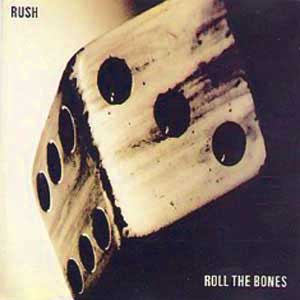
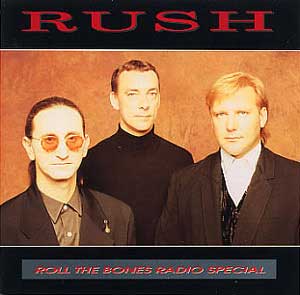

- Atlantic/Anthem, September 3, 1991
- Highest Billboard Chart Position: 3 - Certified Gold by RIAA: October 25, 1991 - Certified Platinum: August 31, 2001
- There were various promotional singles released to support Roll The Bones: "Bravado" (3:49 edit), 1991; "Ghost Of A Chance" (4:25 edit), 1991; and a three part release collectivly called "It's A Rap", 1992. The "Roll The Bones Radio Special" was released by Anthem Records to radio stations in 1991. "It's a Rap" uses segments from the Radio Special overdubbed onto the song "Roll The Bones", and was released as three special edition UK singles in support of the Roll the Bones tour: two were hologram cds, and the third was offered on vinyl as both a 7" standard and 8" picture disk.
- "Where's My Thing" was nominated for the Best Rock Instrumental Performance Grammy in 1992 (their second nomination). The winner was "Cliffs of Dover" by Eric Johnson, from Ah Via Musicom.
- Reissued July 19, 2011 as a Audio Fidelity Sound Labs Gold CD
- Reissued October 23, 2015 by Universal Music Enterprises on 200-gram, heavyweight vinyl with a download code for a 320kbps MP4 vinyl ripped Digital Audio album as well as high resolution Digital Audio editions in DSD (2.8mHz), 192khz / 24-bit, 96kHz / 24-bit.
In Their Own Words
"This one was particularly painless to make. A lot of effort went into it, but at the same time, it was a pleasurable effort. The basic song ideas flowed very freely, and the musical interchange the three of us had was immediate. We finished the writing stage ahead of schedule, which gave me the opportunity to rehearse like a maniac right up to the time I had to record my parts. I felt very prepared, and because of the extra practice, I had an added feeling of freedom to stretch a bit drumming-wise. I felt on top of my game [recording all of my tracks in only a day and a half]. I was amazed. We spent an hour or so setting up drums and getting sounds, and then I just banged out the tunes, one after another. It's the quickest I've been." - Neil Peart, Modern Drummer, January 1992
"During the last tour between Cincinnati and Columbus we had a day off so I bicycled up that trip and got there after a hundred miles, all tired and sweaty and sat down and ate dinner and watched Nova. And there was a program on satellite imaging and they were literally making a road map of Jupiter and they were talking about rivers that they'd been able to map under the Sahara, which used to be a tropical rainforest. Just the imagery of that captured me." - Neil Peart, "Rockline", December 2, 1991
"A friend of mine said 'Where's My Thing?' reminded him of a really perverted version of 'TelStar.' I really like it, but it almost didn't make it onto the record. Though it was a lot of fun, it was also very difficult to get together. Every time we started writing it, it turned into another song. I usually keep extra lyrics lying around while I'm writing the music. If I get into a great groove I'll look at the lyric sheet and realize, 'Hey, this lyric really fits with this music,' and poof, there goes the instrumental. But Neil finally said, 'You've been promising me an instrumental for two years. I'm not giving you any more lyrics until you cough it up.'" - Geddy Lee, Guitar World, December 1991
"Rush's new album, Roll The Bones, revolves around Peart's notion of chance. He recalls sitting in his cottage in the Laurentians with his notes from the past few years gathered around him when he suddenly realized how fate had couched the group 's enormous career. 'Chance is a very serious thing,' he says. 'I mean, we've accomplished a lot of this through discipline and hard work, yet at the same time our endurance has to be directly related to good luck -to successfully rolling the bones. That day in my cottage, I found myself asking very important questions: 'Why has there been this perfect chemistry among band members? Why has our success not jaded us? Why am I here?' I realized that there are no answers. The key, however, is in not asking what we can't do about it - fate and chance - but what we can do about it.'" - Network, February/March 1992
"'Bravado'. It's one of those songs where the writing of it came in an almost spontaneous manner. We found ourselves on the emotional side of things right away and those feelings just poured out of us. When things come out of you naturally, it's a very magical experience. But I think the emotions and music on 'Bravado' really do capture what Rush is about at this time." - Geddy Lee, Hit Parader, March 1992
"One hot night in a village in Togo called Assohoum, in November 1989, I laid out my sleeping bag on an adobe rooftop and lay looking up at the bright stars in the perfect silence of an African night - no traffic, no television, no radio, just scattered conversations or distant dogs. As I was dozing off, a drum rhythm echoed from across the valley, two hand-drummers playing an intrelocking pattern, and it stuck in my head, only to emerge months later as the basis for a rhythm I used in a Rush song called 'Heresy'." - Neil Peart, Traveling Music, pg. 297
"Just recently I listened to the song 'Neurotica' and I thought, what the fuck was that? It's just a strange tune. I feel we've had a very up-and-down career as songwriters, but one thing that's always held true is our honesty about what we're doing. Like it or not, this is what we are [laughs]." - Geddy Lee, ClassicRock.com, May 2015
Promos
Smartphone Wallpaper
Our RUSH smartphone wallpapers have been modified for a 9:19.5 aspect ratio to fit "most" Smartphones.
This is a collection of transcripts of magazine and newspaper articles and other media related to this release or coinciding with the time frame surrounding it. This is an ongoing work in progress; feel free to email any suggested additions.
